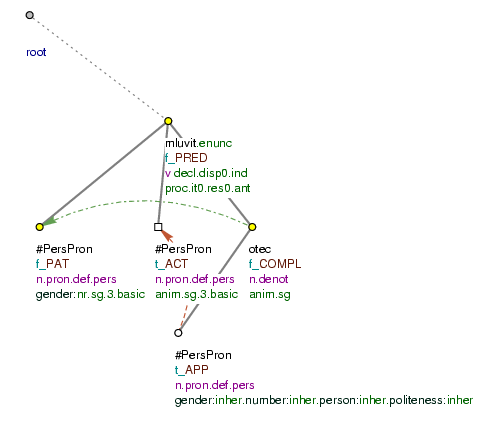At the tectogrammatical level, also cases of the so-called predicative complement are represented. The predicative complement is a non-obligatory free modification (adjunct) which has a dual semantic dependency relation. It simultaneously modifies a noun and a verb (which can be nominalized).
These two dependency relations are represented by various means:
-
the dependency on a verb is represented by means of an edge (which means it is represented in the same way as other modifications),
-
the dependency on a (semantic) noun is represented by means of the attribute
compl.rf, the value of which is the identifier of the modified noun (see Table 6.6, "Values of the attributecompl.rf").
A non-obligatory modification which has these two dependency relations, i.e. a modification which is considered a predicative complement, is always assigned the functor COMPL (see Section 11, "Functor for the predicative complement (COMPL)"). Each node with the functor COMPL (and only such a node) has therefore the attribute compl.rf filled with a value.
Compare:
-
Mluvil o něm jako o svém otci.
COMPL(=lit. (He) spoke of him as of his father)The dependency of the predicative complement jako o (svém) otci (=lit. as of (his) father) on the verb is represented by an edge: the node which represents the predicative complement (the node with the functor
COMPL) depends on the node representing the verb mluvit (=to_speak). The dependency on the noun (the prepositional phrase o něm (=lit. of him)) is represented with the help of the value of the attributecompl.rf. The value of the attributecompl.rfis constituted by the identifier of the node for the prepositional phrase o něm (=lit. of him) (cf. Fig. 6.166).
The dependency on the noun with some types of predicative complements is formally marked by the agreement of the grammatical categories (gender and number) between the predicative complement and the governing noun. The dependency on the verb is - with some types of predicative complements - formally marked by the assigned case (for more details see the description of the individual types).
Borders with arguments. Valency modifications (prepositional or non-prepositional) which can be considered to have a dual depedency are represented as arguments of the governing verb and their functor is usually PAT or EFF; their dependency on a noun is determined by the meaning of the verb as it is described by a valency frame. Cf.:
-
Hodnotil situaci jako špatnou.
EFF(=lit. (He) evaluated (the) situation as (a) bad (one).) -
Jako odborník.
COMPLhodnotil situaci jako špatnou.EFF(=lit. As (an) expert (he) evaluated (the) situation as (a) bad (one).)
For the dual dependency see also Section 1.1, "Dual dependency".
Borders with other adjuncts. Modifications expressed by adverbs and prepositional phrases are not considered predicative complements. Their semantic relation is not clearly dual, unlike the predicative complements; their semantic scope usually varies. They are represented in accordance with the rules described in Section 11, "Ambiguous structures". Cf.:
-
Babička seděla u stolu shrbená.
COMPL(=lit. Granny was_sitting at (the) table hunched.) -
Babička seděla u stolu shrbeně.
MANN(=lit. Granny was_sitting at (the) table in_a_hunched_way.)
-
Závodník skončil druhý.
COMPL(=lit. (The) contestant came second.) -
Závodník skončil na druhém místě.
LOC(=lit. (The) contestant finished on (the) second place.)
Figure 6.166. Representing the second dependency of a predicative complement

Mluvil o něm jako o svém otci. (=lit. (He) spoke of him as of his father.)
The following sub-sections provide a detailed description of individual types of predicative complement constructions which are divided into three groups according to their form:
-
predicative complements expressed by a noun (see Section 10.1, "Predicative complement expressed by a noun"),
-
predicative complements expressed by a verb form (see Section 10.2, "Predicative complement expressed by a non-finite verb form"),
-
predicative complements expressed by a dependent clause (see Section 10.3, "Predicative complement expressed by a dependent clause").